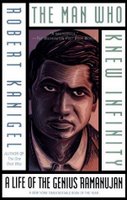A book which is both narrative and explanation. I usually don't enjoy history all that much -- but I do like biographies and personal histories. And this book is mostly personal history, with lots of extra stuff thrown in. The main character is Ramanujan, a man born in southern India who grew up in the early twentieth century. He didn't have much training, but liked to please people so did well in school until he finished high school. From then on, he wanted to do little but work with mathematical formulas and possibilities. It wasn't the application of math that he enjoyed - but simply the abstract formulas and ideas. (Very different from your typical student.) By a series of events, he ended up in England working with and studying under a Cambridge fellow named Hardy. Together they created an incredible number of papers and had an impact on the mathematical world. In a speech Hardy gave after Ramanjuan died, he said that the most important thing he had done in his life was discover Ramanujan.
Now, Ramanujan was not just any southern Indian -- but a Brahman, meaning he was part of the highest class simply because of the family he was born into. His mother in particular taught him to follow all regulations in terms of what he would and would not eat, how things were to be prepared, and worshiping their goddess. Throughout his life, he gave credit to this goddess for intuitive jumps, for visions, for his genius. Many colleagues (especially those from England) had a hard time believing he was serious -- for them, science and logic excluded any religion. But for Ramanujan they were closely linked and one did not make sense without the other. In fact, he drew connections between certain mathematical series and facets of the gods of Hinduism. Seems so true that neither logic and reason, nor spirituality and emotion, can be the sole answer to life's questions. Both must be involved!
Enjoyed getting pieces of India's history, especially during the beginning of the book. Ramanujan was around while the British occupied, so all those ties and differences and beliefs color the personalities on both sides and what sort of connections were possible. Many Indian mathematicians didn't know if Ramanujan was a genius or a fool -- because his math notebooks were full of ideas they had never heard of and couldn't prove or understand themselves. Once this book got into Ramanujan's (and Hardy's) story, I was frustrated at the end. The last thirty or forty pages were mostly about repercusions, debates, ideas of his effect on India and the world. Took me probably an extra two weeks for those last thirty pages -- and ended up skimming them. Guess I got attached to Ramanujan and when he died, my interest in the story lagged quite a bit. But -- overall, a book that shares complicated math in understandable terms while sharing the mathematician's life (beyond math) in comprehensible ways as well.
| Title: | The Man Who Knew Infinity: A Life of the Genius Ramanujan |
|---|---|
| Author: | Robert Kanigel |
| Date published: | 1991 |
| Genre: | Biography, Math |
| Number of pages: | 373 |
| Notes: | Recommended by JAW |



0 comments:
Post a Comment